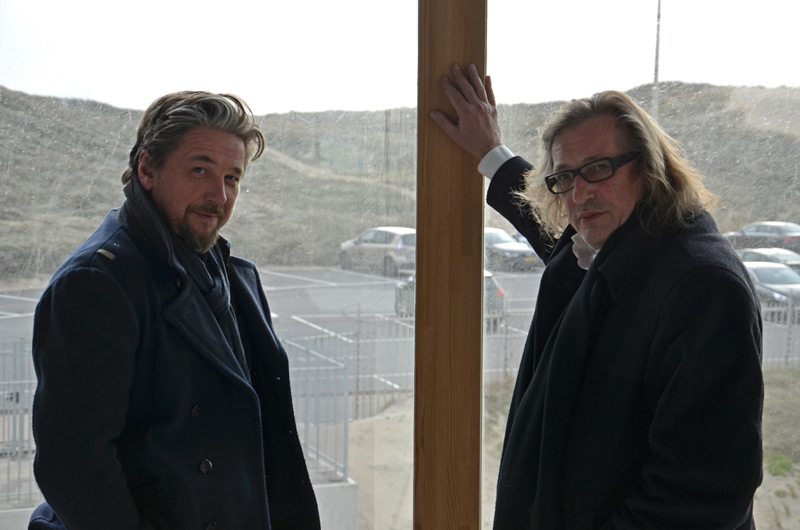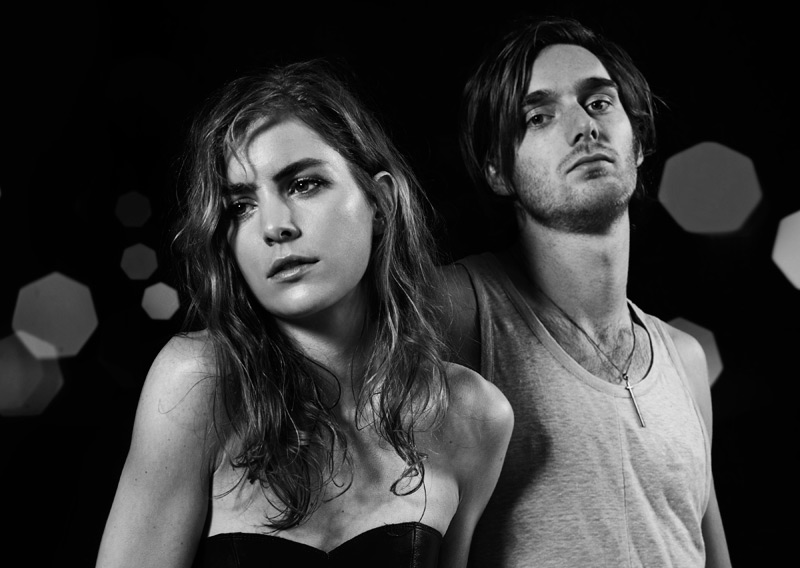Adam and Eve. Noah. Babel. Joseph. An entire book of the Bible Johan Doesburg casts in his farewell performance with the Nationale Toneel. 'Genesis' lasts 6 hours including intermissions, has 65 speaking characters and plays with the space of Scheveningen's Zuiderstrandtheater. But above all, the outgoing director wants it to tell two stories. In conversation with Johan Doesburg and actor Dries Vanhegen, whose character Jacob plays a special role in the play.
As early as 18 years ago, Doesburg and writer Sophie Kassies walked around with the idea of bringing 'Genesis' to the stage. That idea fell through for financial reasons. Two years ago he decided to go ahead with it after all, "if necessary in the smallest room with 10 chairs and 2 cardboard boxes. But he didn't have to. The postponement of building plans on The Hague's Spuiplein meant that the brand-new, temporary Zuiderstrandtheater sat empty for half a season. 'The clever thing is, this building was built in nine months for 16 million euros. Compared to what the Spui Forum should have cost, that's nothing. The location is great. You sit on the beach drinking coffee and you walk straight into the theatre, you can park for free, try that at the Royal Theatre.'
'We are going for austere means and maximum storytelling. I have turned the theatre floor into a flat-floor theatre, with a movable stand for up to 320 people. There are some scaffolding, there are video cameras. As an audience, you get different perspectives. The actual theatre becomes part of the set, which is the desert in the part where Joseph is viceroy of Egypt.'
Devastated mythology
Doesburg is surprised that so little has been done before with the book of Genesis. 'Exodus has been filmed a lot, but Genesis has not, even though it is the story of the three patriarchs: Abraham, Isaac and Jacob, and his son Joseph. It is divine material and they are good stories. Think of it as our Christian mythology. Greek mythology is treated in exhaustive detail, but the Christian one we neglect because of secularisation.'
'The epic nature appealed to me. Genesis is the struggle for survival of a people who call themselves chosen. A people who think "We are going to save this, because we are better than the rest and we believe in one God." Genesis underlies the three monotheistic religions and they are all found in The Hague.'
In 'Genesis', Doesburg follows two common threads. The first theme is migration. 'This starts with Adam and Eve, who as punishment must leave the Garden of Eden and go in search of the promised land. That land is not reached in the entire book of the Bible. As humans, we are all on a journey, in need of a better life, but we never arrive.'
Key figure in the show is Jacob, the third patriarch. As an older man, he tells the audience how it all came to be. Dries Vanhegen performs this role. He says: 'When Sophie wrote the play, she asked all the actors for a personal story. A friend of mine had suffered a painful loss of a child. That's where the idea arose to have Jacob tell the story when he thinks his son Joseph has died. What kind of God are you who took my children away from me? He feels rebellion and sadness, no longer knows who he is. Jacob tells the story as a kind of weblog, a slideshow of his own life. Often second-hand: "I heard that from that one, and that even from a Syrian, a stranger, so I don't know what to make of it". Sophie is very good at that.'
I am who I am
Vanhegen finds Jacob the most interesting of the three patriarchs. 'Abraham and Isaac are orthodox, but Jacob is rebellious. He dares to fight.'
Doesburg: 'He has snatched the firstborn right from his brother Esau, and there he is in the desert with his piece of paper. He wonders: was I sent by your hand, God, or did I do this myself? God tells him, "You have no choice, I am who I am." Jacob is the first to say, "Do I exist because you are there, or is it the other way around? Because I am also who I am!" He has a transverse, questioning, philosophical side.'
Vanhegen: "And doubting is more interesting than knowing it all already.
Doesburg: 'By the way, we don't have God performing live. You do hear his voice, in somewhat archaic words: "And he said..." But other than that, the language in the play is clear as glass. We take the liberty of elaborating on things or skipping them. And we give women more text than in the Bible.'
Aboutaleb
Jacob's son Joseph is also a fascinating, topical character, Doesburg thinks. 'Joseph is the first child from his already older, dearest wife Rachel. Thrown out by his brothers because he is clever, a dream-duster, he is thrown into the well and sold as a slave. This is how he ends up in Egypt. There he manages to work his way up to become viceroy. What do you think of then? I think of Aboutaleb. A man from the Rif mountains who became mayor of a city of 800,000 people here, who is also Muslim and who manages to incorporate that without biting. It presents a great moral dilemma, including in the performance. Joseph's father Jacob thinks Joseph is dead. Twenty years later, they meet in Egypt. Joseph says: "Come live with me in the palace." But Jacob says: "I am a shepherd, I smell of goat and dung. You are no longer my son, you have become an Egyptian."'
Vanhegen: "He says, 'You could have notified me earlier that you were alive! But you didn't because you don't remember our stories." A culture breakdown. Aboutaleb is also no longer seen as "one of us" by some Moroccans.'
The second thread, then, is the role of stories in identity and culture. Doesburg: 'The Old Testament emerged from an oral culture and was later canonised. Just like Homer. There are also overlaps. Agamemnon sacrifices his daughter Iphigeneia at Aulis to beg favourable winds for the fleet. The army of 60,000 men he has summoned lies in the plain and begins to grumble. So are you willing to sacrifice your own child? Abraham is instructed by God to sacrifice his son Isaac and is willing to do so. That willingness is also enough, because God saves Isaac. I am also thinking here of General Van Uhm. He stands for an ideal and also takes the risk himself that he calls others to. A week after he became commander-in-chief, his son was killed in Iraq. How does a man like that hold up then?'

Mental incest
Doesburg sees ethics and morality as summaries of a culture's stories. 'You are part of our identity if you share our stories. If you overshoot in that, you become a fundamentalist or a nationalist. Overlapping with other cultures means enrichment, staying within your own circle leads to mental incest.'
Vanhegen: 'We can't do without stories. We now have a bit of a situation like in Babel: no one understands each other anymore, we run after every new thing, whoever wants to, invents a new story for themselves.'
Doesburg: "You see it on Facebook. "I am now standing at the bus stop in the rain". "Look what a delicious cake". We miss big stories in our lives. I hope that that recognition comes up as you as an audience follow the great stories from Genesis.'
Vanhegen: "We need togetherness. That's why you see a football stadium full of people waving a candle to mourn a singer, that's why we applaud victims of MH17. Twenty years from now we will say: I was there so I am someone.'
So, although nowhere specifically named, Genesis is full of topicality. Vanhegen: 'With Noah's Ark, I see images of Lampedusa before me. People are still willing to die to have it better somewhere else.'
Apart from Dries Vanhegen, almost all the actors play many different roles. That means changing roles often. 'It's easier for some actors than others,' says Johan Doesburg. 'But there are also roles of a shepherd standing by the well.' Vanhegen protests: 'Even a shepherd has to be right as a character, you have to empathise with that too.'
The end is the beginning
It seems curious that Johan Doesburg should end his career with the National Theatre with the beginning book of the Bible. He smiles delicately. 'That is constructed coincidence, as Mulisch so beautifully called it. The end is the beginning. It is exactly thirty years since my first direction. That was Pinter's The Homecoming, speaking of constructed coincidence. My father worried a lot about me. I started acting late, did three studies, had three employers. Then eventually I went on to do director's training. My father just missed the premiere of my first play. He only got the sores from me. And then The Homecoming also had a bit of a prodigal son theme...'
'In a few weeks, I will turn 60, and then a third phase of my life will begin. How long it will last I don't know. I have no pretensions, I take the risk, I have no insurance. I have nothing planned, but I can always make theatre. If necessary, I'll move in with my in-laws in Drenthe, go compete with the Shakespeare theatre in Diever.'
Information and playing dates: www.nationaletoneel.nl/genesis

